
介绍:
China's top legislature is considering revisions to the country's Air Pollution Prevention and Control Law amid growing public concern over air quality. This will be the first revision in 15 years.
Our reporter Wang Mengzhen is finding out how deputies at the ongoing National People's Congress session are pushing forward with the changes.
Luo Yuanfang is an expert in polymers, and a deputy to the National People's Congress. Over the last three years, she has been raising motions on controlling the country's smog problem.
Her ideas are based on managing the issue at the pollution source, rather than simply monitoring the pollutants.
"In 2013's session, I raised bills about how "high-performance" tyres can help control airborne particles, including PM 2.5. Last year, my motion was about the revision of the air pollution law. And this year, my focus is on stepping up the amendment and enforcement."
Last December, the National People's Congress launched its first review of the amendment for China's Air Pollution Prevention and Control law.
Due to her strong commitment, Luo Yuanfang was invited to review the draft with China's top environmental officials and experts.
Last year, several cities including Beijing and Shanghai spearheaded amendments to their respective air pollution regulations.
Deputy Zhang Quan, environmental chief in Shanghai, raised a motion on how the new regulation in his city could be used as a reference point for the amendments now being debated.
"The old law has a high enforcement cost, but a low cost for breaking it. Based on our experience, we need to design some simple enforcement rules to determine whether a practice is against the law. For example, if black smoke is still coming out from vehicles or factories, it is obviously an illegal behavior, with no further evidence needed. "
With the revision process underway, several issues are still heatedly discussed among deputies from all walks of life.
Among them, the most controversial one is whether the traffic control plan, especially the odd-even license plate rule, can be written into the law.
The amendment also highlights that air pollution monitoring and management will be shifted from the city level to a regional scale, such as the Beijing-Tianjin-Hebei region and the Yangtze River delta.
But, the key lies in how it could be implemented between cities with different development models.
Deputy Bao Jingling, an environment expert based in Tianjin, believes the UN Principle "Common but differentiated responsibilities", could be applied to address the issue.
"For instance, without the help of Tianjin and Hebei, the blue skies during Beijing's APEC summit last year could not be maintained. However, I do not think all environmental standards need to be the same across the nation. Different cities can set different emission standards based on their own situations, while the standards must be higher than the national level."
Last year,80 percent of more than 300 cities monitored failed to meet official standards on air quality.
With the new Environmental Protection Law taking effect this year, deputies are now looking forward to the revised air pollution law, which is expected to be finalized during next year's parliamentary sessions.
For CRI, I am Wang Mengzhen.
大家还在听

